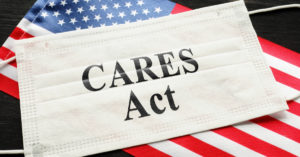CARES Act for Consumers & Small Businesses

The U.S. Government enacted the Coronavirus Aid, Relief, and Economic Security Act (CARES Act) to help individuals, families, and businesses across the U.S. access emergency assistance during the COVID-19 pandemic.
Some parts of the $2.2 trillion economic relief package provided financial assistance to qualifying individuals and families and revised certain sections to the U.S. Bankruptcy Code to give individuals and businesses more access to bankruptcy relief. Other parts of the CARES Act focus on helping small businesses and their employees survive the crisis.
CARES Act Modifies Provisions of Chapter 13 Bankruptcy
For individuals and families with incomes below certain thresholds, the CARES Act provided stimulus payments of $1,200 to qualifying individuals and $2,400 for married couples, with an additional $500 for each child under age 17.
The payments prompted some bankruptcy questions about whether the stimulus checks should be counted as part of the monthly income or projected monthly income of individuals applying for bankruptcy or developing repayment plans.
The CARES Act amended the definition of current monthly income in the bankruptcy code to exclude stimulus payments made related to the COVID-19 pandemic for the purposes of calculating eligibility for Chapter 7 or Chapter 13 bankruptcy.
The CARES Act states that payments made to individuals for coronavirus relief do not qualify as disposable income and are not required to be included in a Chapter 13 debtor’s wage-earner plan.
Another provision of the CARES Act allows chapter 13 debtors to seek modifications to confirmed chapter 13 repayment plans if they are experiencing financial hardship as a result of the COVID-19 pandemic. Debtors who previously sought relief under chapter 13 and have repayment plans in place may petition the court to make changes to their repayment plans to defer payments on certain kinds of debt such as mortgage loans or credit card debt, based on this provision of the CARES Act.
For example, people who previously had a regular income and qualified for a chapter 13 wage earner plan and have since lost their jobs due to the pandemic would likely meet the criteria for having experienced financial hardship and qualify for a plan modification.
The CARES Act allows the bankruptcy court to extend a debtor’s repayment schedule for up to seven years from the date of the first payment of the original plan.
CARES Act Provisions for Small Businesses
Several provisions of the CARES Act are specifically intended to support small businesses harmed by the COVID-19 crisis and provide increased access to bankruptcy relief.
The CARES Act raises the amount of debt a small business may have and still qualify for relief under the Small Business Reorganization Act. The SBRA, which became effective in February 2020, provides options to small businesses considering Chapter 11 bankruptcy relief.
The CARES Act expanded eligibility for small businesses to Chapter 11 relief using the SBRA by raising the maximum amount of debt a small business may have and still qualify. The Bankruptcy Code set the qualifying debt limit for small businesses at $2,725,625 including secured and unsecured debt. The CARES act temporarily amends the law to increase the maximum qualifying debt load from $2,725,625 to $7.5 million. That provision expires in March 2021.
Talk to a Bankruptcy Attorney Now
Many people and businesses in North Carolina and across the nation are struggling during the coronavirus pandemic.
If you have questions about your options to seek relief as an individual or small business under the CARES Act, contact Sasser Law Firm today. With more than 20 years of experience in bankruptcy law, our skilled and compassionate North Carolina bankruptcy lawyers have what it takes to help you seek the relief you need. To schedule your free consultation, call us today, or contact us online.
- About the Author
- Latest Posts
For more than 20 years, the Sasser Law Firm has been helping individuals and business owners sort through financial hardships to see the light at the end of the tunnel. Our North Carolina bankruptcy attorneys are all board-certified specialists, which means we have passed a complex exam, undergone a thorough peer review, and continue to earn legal education credits in this ever-evolving area of law.














